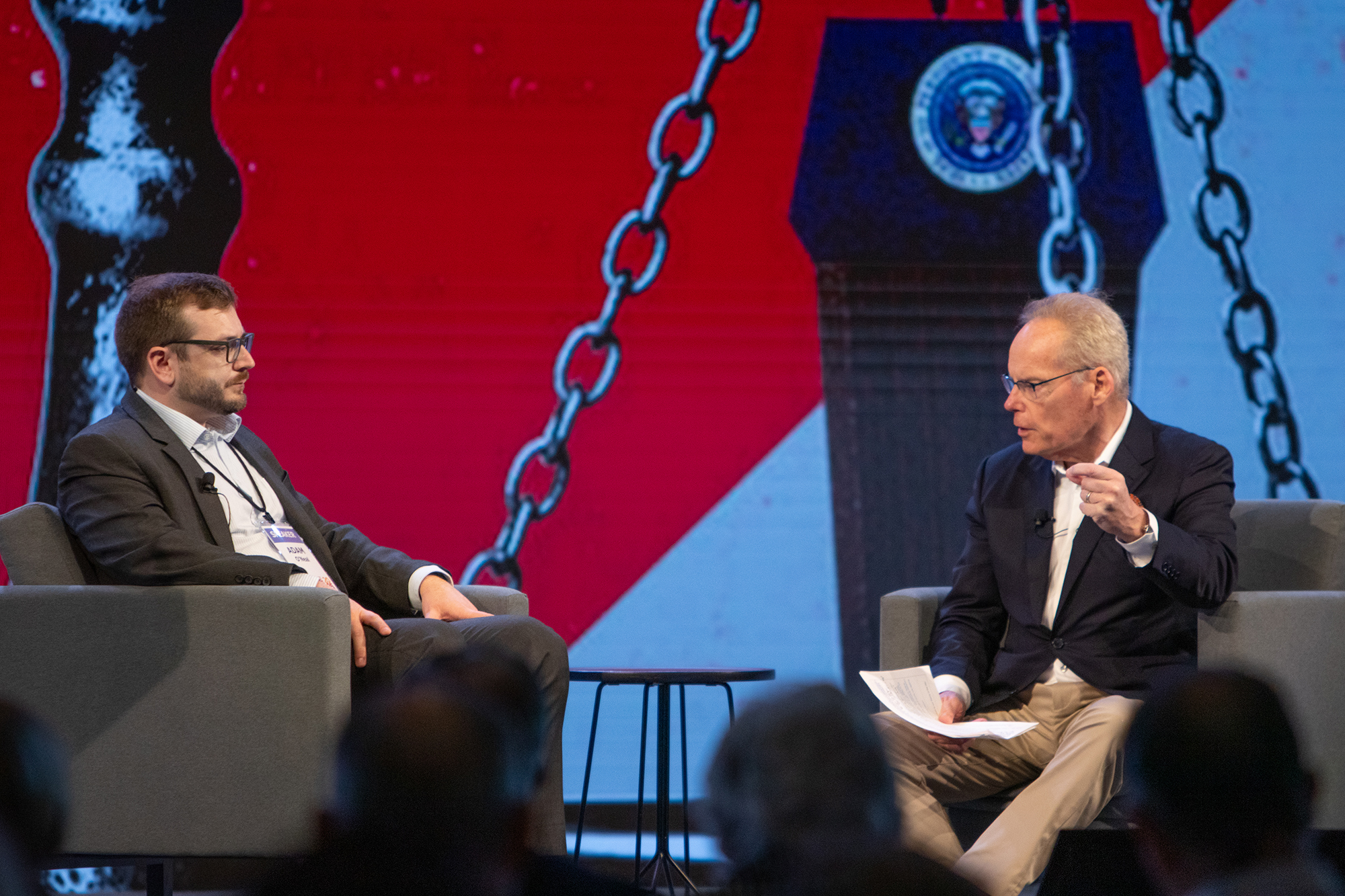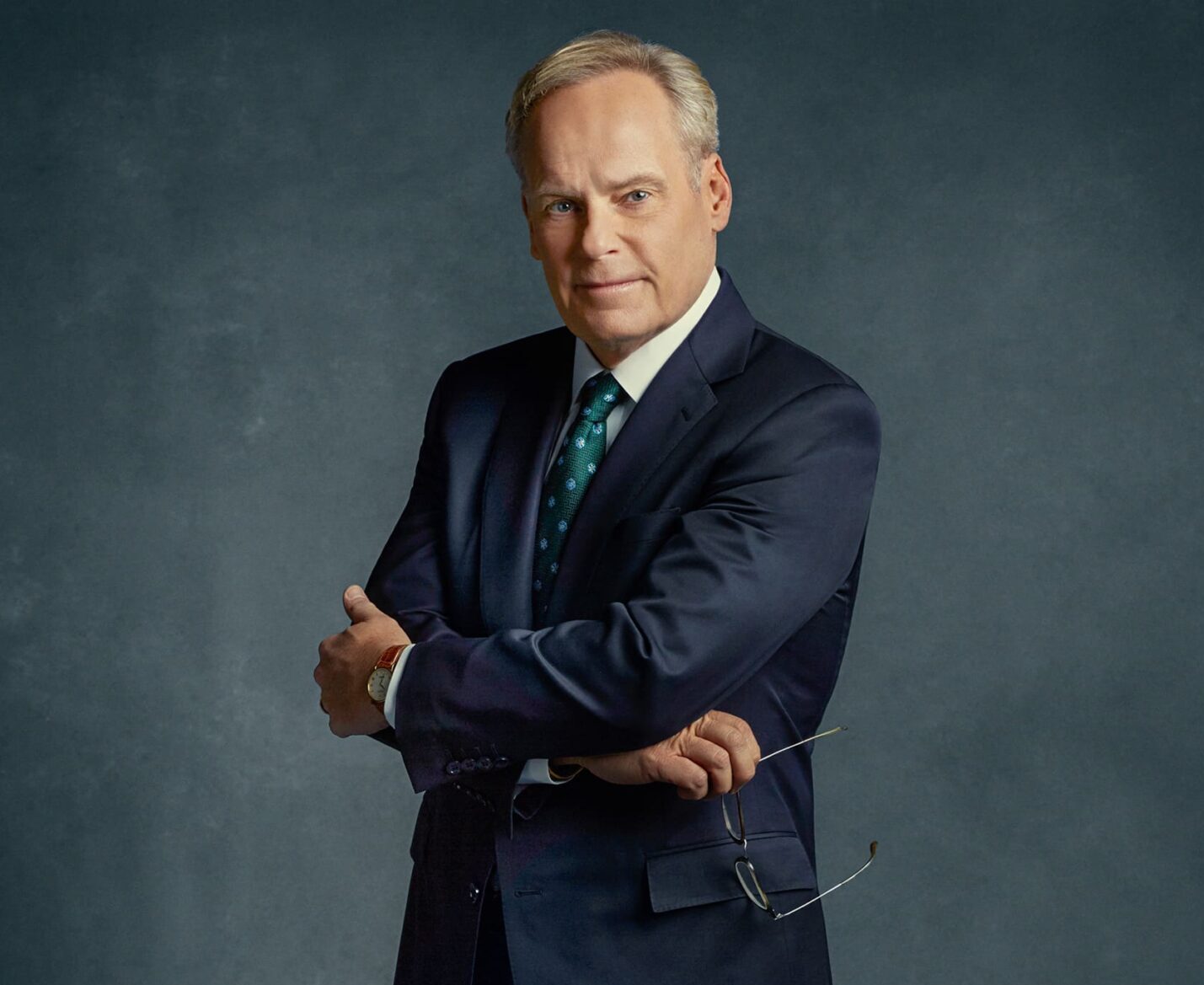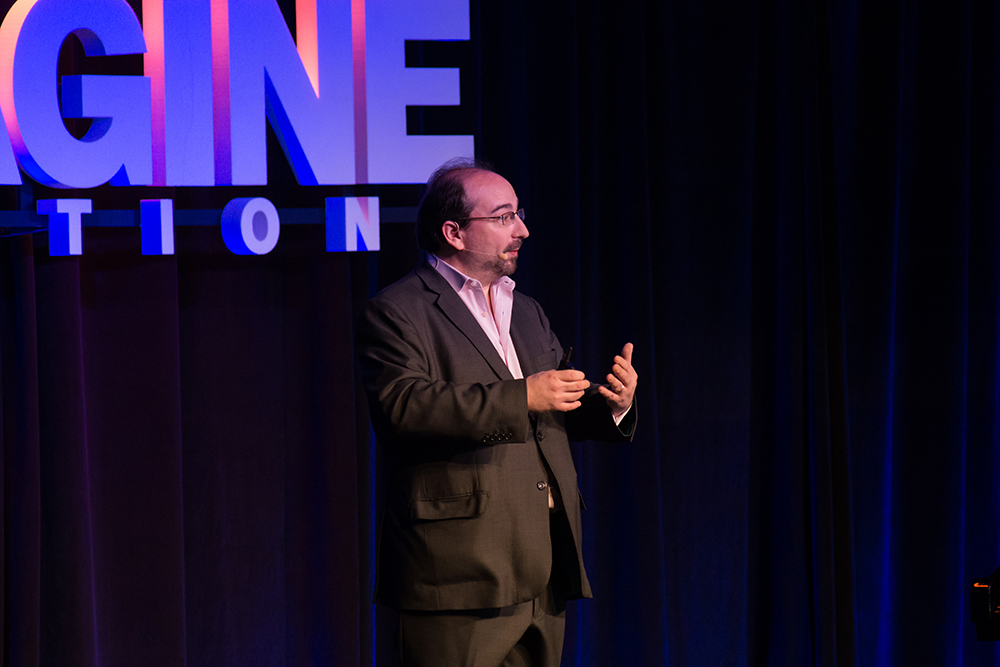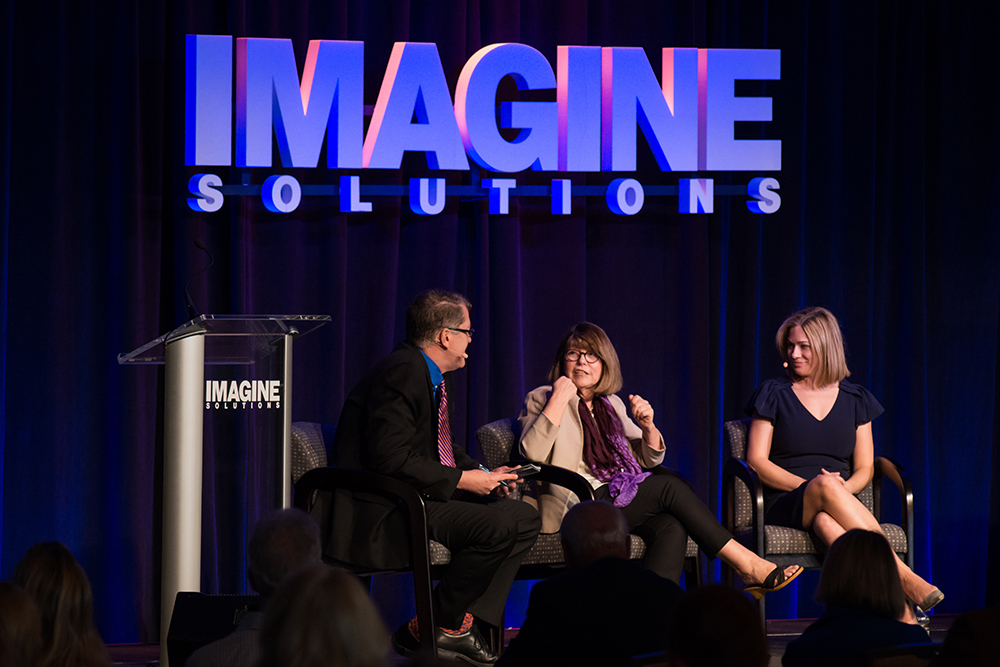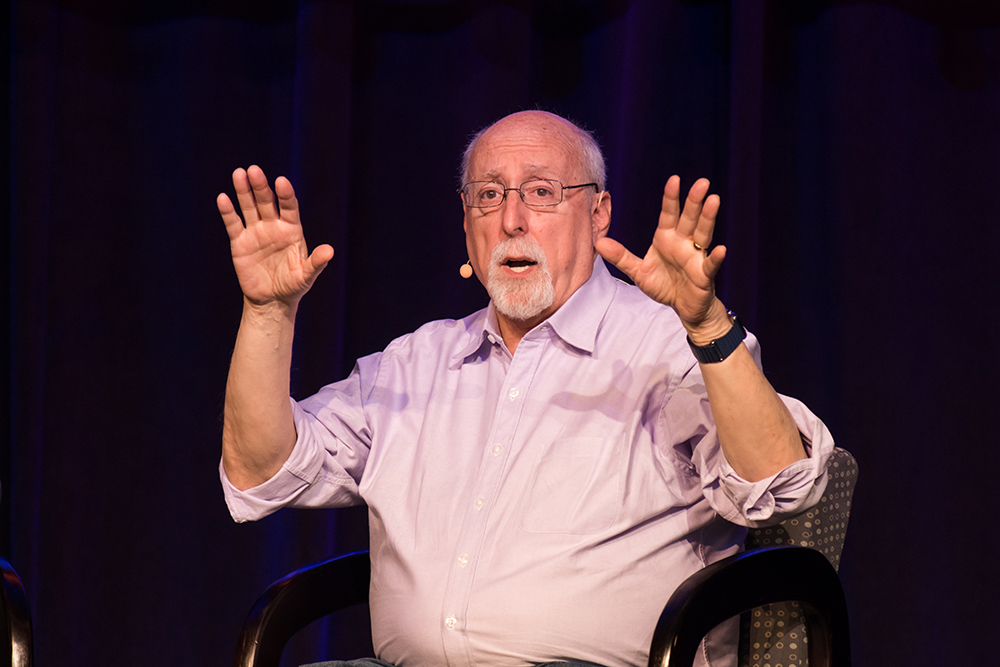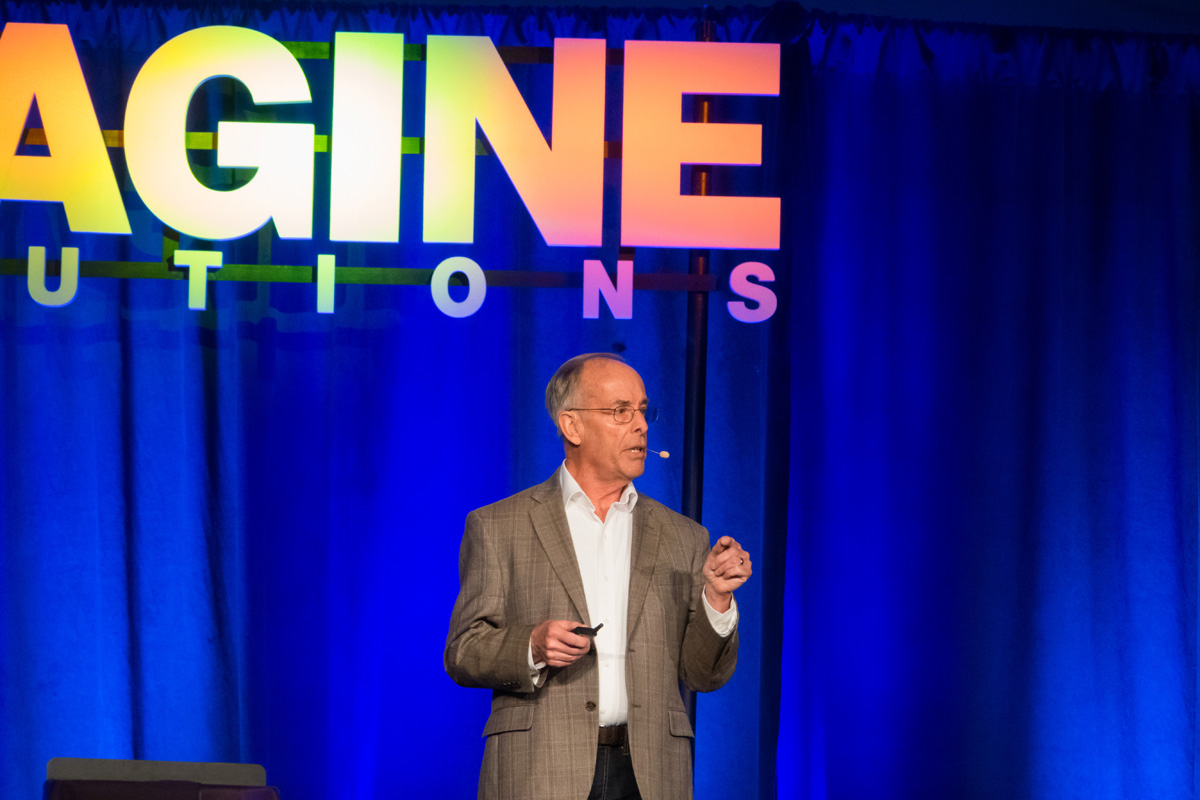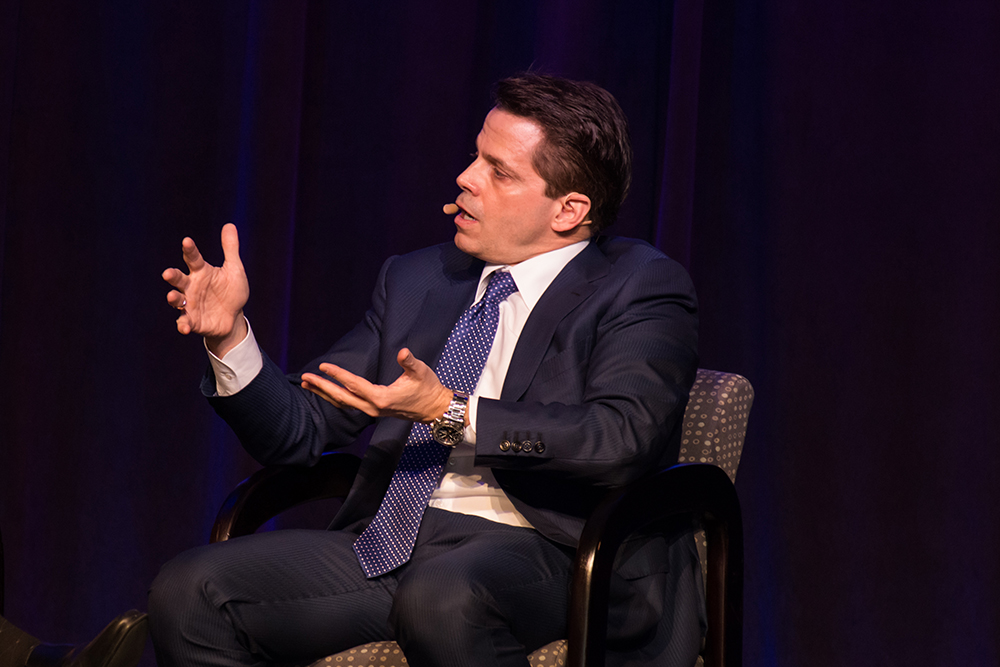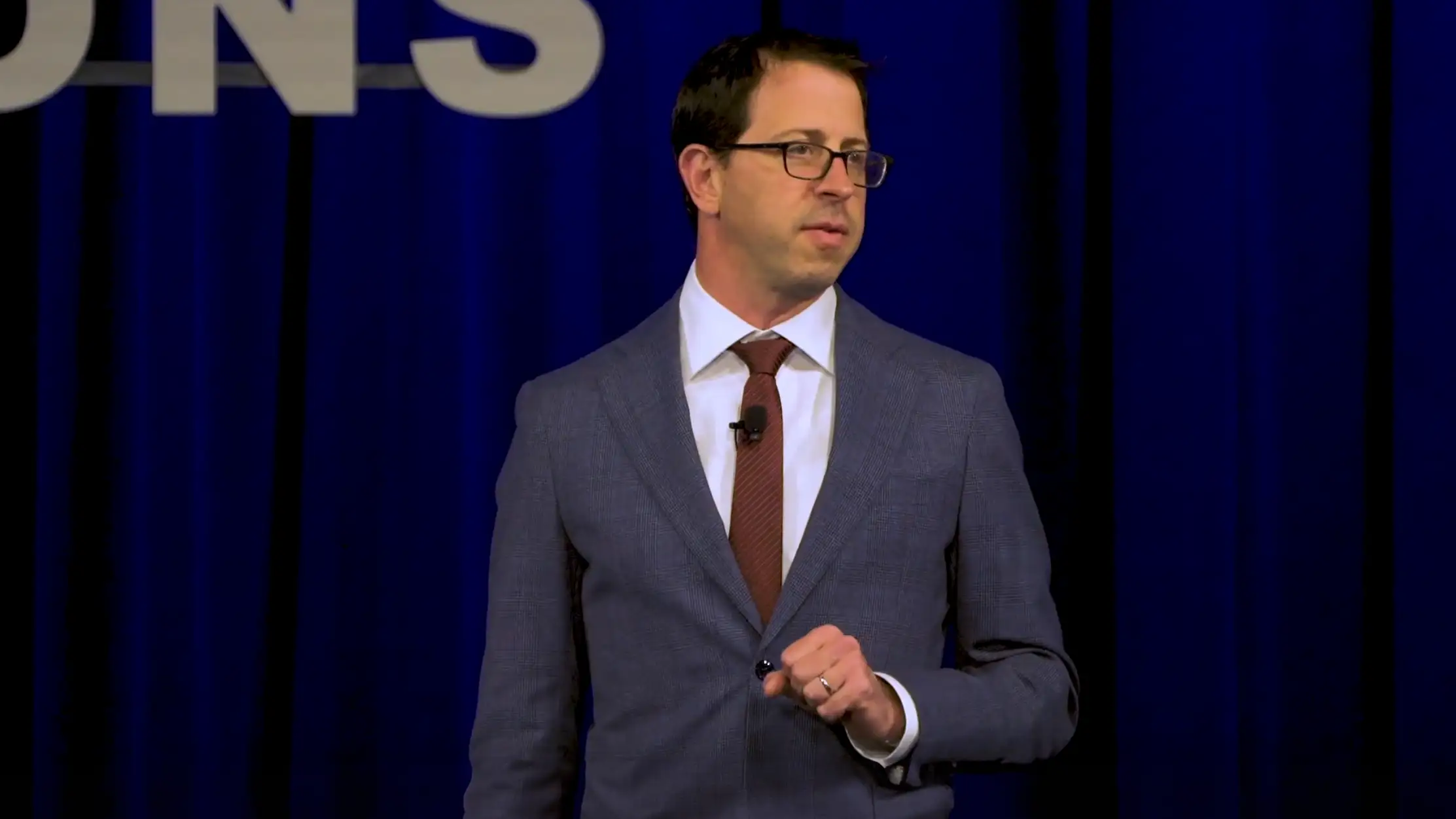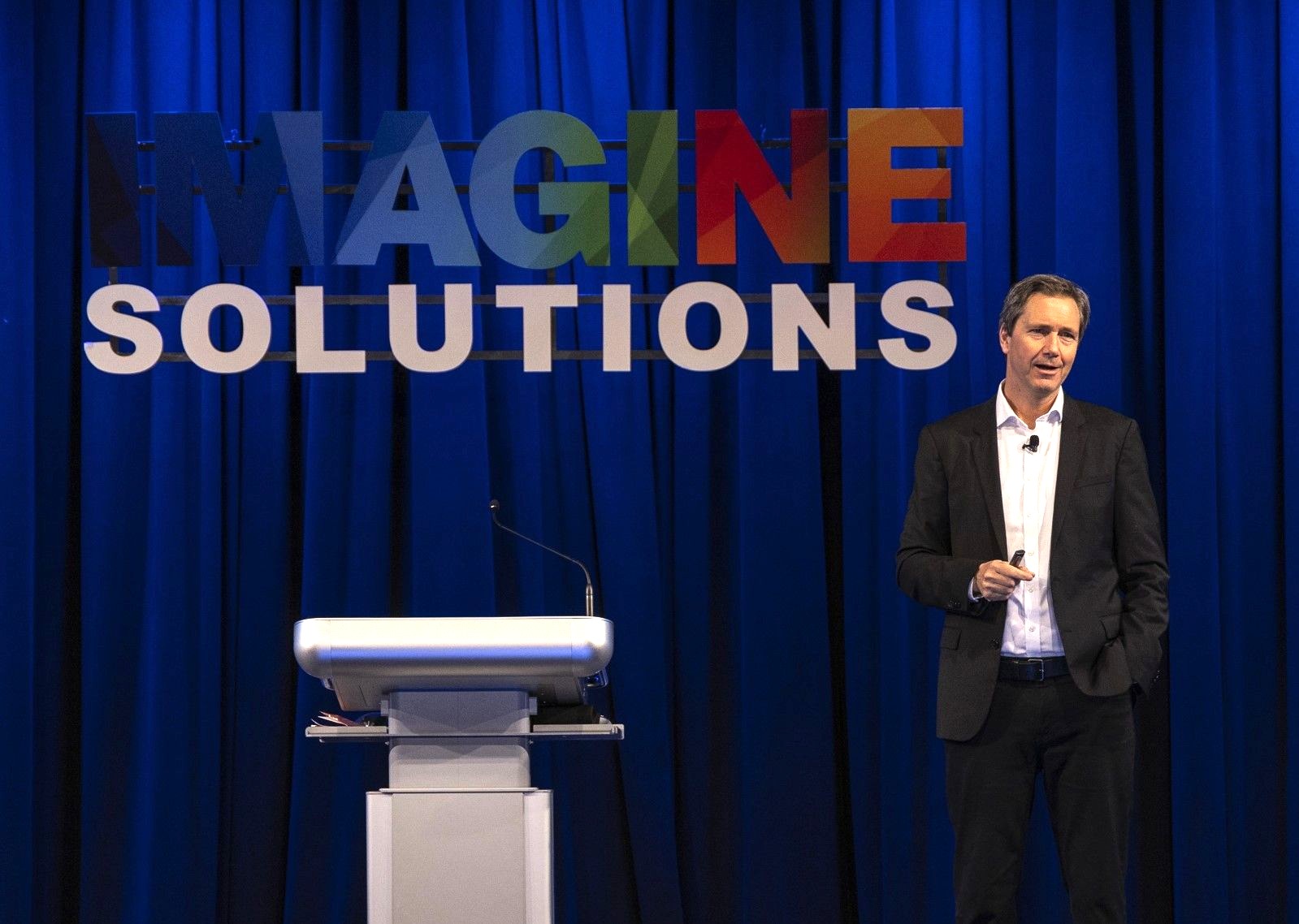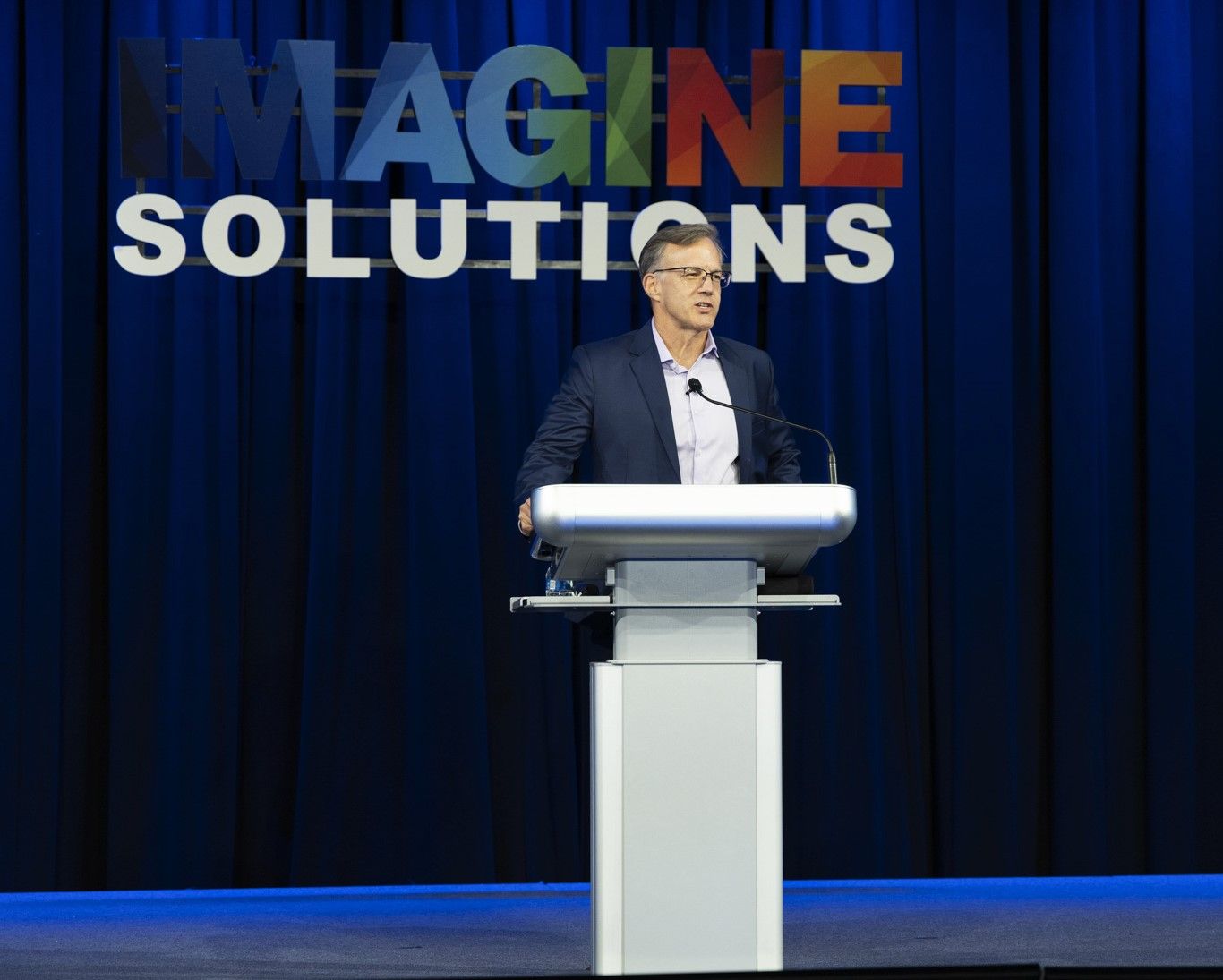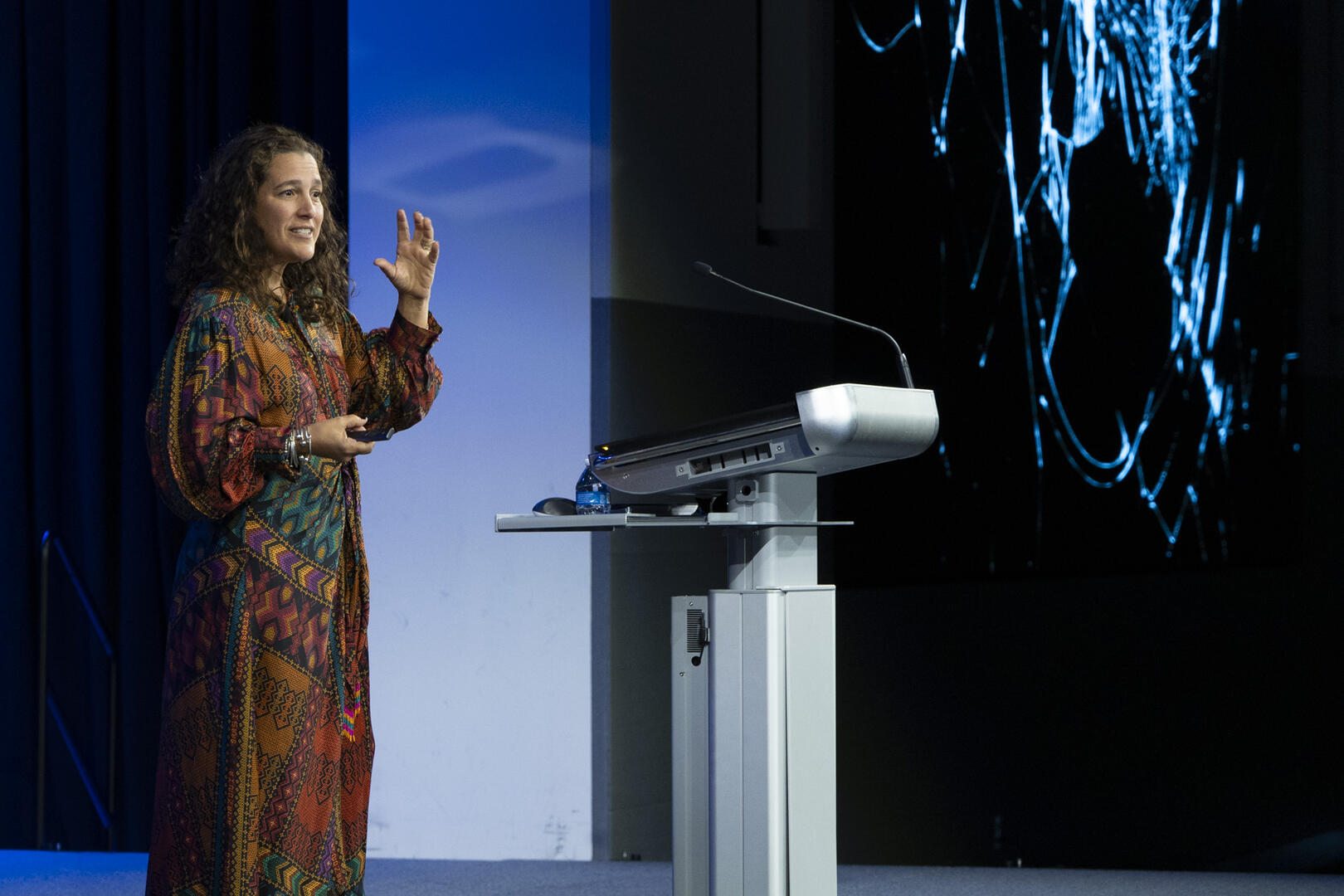Adam O’Neil/The Economist interview with Moderator Tyler Mathisen
In a thoughtful and timely exchange, The Economist’s Adam O’Neal and CNBC’s Tyler Mathisen explored the wide-reaching implications of recent federal budget cuts across multiple agencies. O’Neal offered a clear-eyed, nonpartisan analysis of how these reductions are impacting science, innovation, and public institutions. The discussion helped the audience better understand the policy shifts underway in Washington and their real-world consequences. Grounded in facts and framed with context, this important conversation highlighted the delicate balance between politics, funding, and progress, giving the audience a nuanced understanding of current affairs.
00.11
hello everybody Good morning once again This is all new to me I've only been here 14 times before It's great to be back with you I know so many of you And I think the highest compliment to uh Imagine Solutions to Randy and his team is the fact that so many of you come back year after year So give yourselves some applause for coming back I really appreciate it Thank you all very much This is our fourth year here at uh the U innovation center Uh and uh it's a wonderful place to be Some things are the same There are still lots of sort of medieval looking devices out in the lobby that do all kinds of amazing things uh for medicine and for people's health but they are very bizarre And when you go and check into your room here instead of having a sort of welcome
01.02
video on your screen I don't know whether I've said this before instead of having a welcome video on your screen with beautiful uh you know sunsets and so forth you see actually arthoscopic surgery on knees and and so forth It is quite jolting when you walk in What is the same here is those medieval devices What is the same is we have a full house And what is the same is that if you're among the first hundred to sign up for next year's Imagine Solutions Conference we throw in a free knee or hip replacement if you want it What is different this year is that it appears there's going to be some rain for maybe the first or second time uh of all 15 of these events Uh what is also different is that when I went swimming yesterday I swam in a totally new body of water the Gulf of America and all the fish understood the new official language English So welcome ladies and gentlemen
02.00
for what is the same and what is different this year And I promise you what is going to be the same is that you are going to be uh bombarded with fresh ideas and insights and some of the best speakers uh and greatest thought leaders and thinkers the world over This is the 15th annual Imagine Solutions Conference and once again as I mentioned for the fourth year in a row we're delighted to be hosted here at the Arthrex one conference center and event space It is fantastic and we want to thank Reinhold Schmiding and Arthrex for their continuing hospitality If you Yes indeed And Larry Lancet and his team uh behind the stage They do an amazing job at making the production come together I think by the end of the day you will come to appreciate uh this venue even more than you do right now Uh if you've been here before you know what you're in for If you haven't I promise you a day of learning of laughter enlightenment and big ideas from some of the world's
03.00
most accomplished individuals and greatest thought leaders Our theme this year in fact is one day of big ideas And you will as the saying goes be confronted with a real fire hose of ideas all day long You will be drinking from that fire hose of ideas You'll hear from leaders creators discoverers scientists cutting edge researchers Uh you will hear from artists and many many more And what they all have in common is that they have impacted thousands maybe even millions of lives the world over So maximize your experience here You'll get the most out of today's event if you get out of your own personal comfort zone You all know a lot of people in the audience you're friends with one another but I ask you to reach out to the people you don't know uh and get to know somebody because it's the connections uh that really make this day come alive While we generally don't take questions from the audience and we're not going to vary from that this year for a variety
04.00
of reasons uh get to know some of the people you don't know uh go up and speak to some of the speakers whom you'll see during the breaks and at lunch They are eager to exchange ideas with you to engage and to get to know you That's where you can get your answers to the questions you have uh in a much more intimate session So step up lose your shyness and engage with those speakers as well We're going to begin today's program in a little bit of a non-traditional way for uh Imagine Solutions We're going to do an interview right off the top and I'm going to conduct it We usually don't do interviews again for a variety of reasons and uh we usually don't go near anything that is remotely political That is because we respect you the audience too much to assume that we understand all of the various dimensions of political thought or your particular feelings about political things But today we are going to tiptoe right up to the edge of the political waters to
05.02
discuss the broader national in context that is affecting scholarly work and research in the sciences and humanities So our our our mission in stepping up to the edge of the waters politically is very particular and very narrow We choose to do it because for the first time in Imagine Solutions's 15-year history we have had five speakers withdraw at the last minute So the speakers you may have expected to see who are represented in your program books some of them will not be here today Now on the surface the fact that a few speakers canled on us last minute is not big news It's not stop the presses kind of stuff Things happen But in this case the reasons for the withdrawals are notable One was a medical matter That's understandable But four others Katie Quan Peter Lee Jeffrey Rosen and Tammy
06.01
Ma said in effect that they were not able to leave their posts given the uncertainty surrounding federal grant monies research funding and program staffing They were my word not theirs too frightened to come Now that is interesting That is worth lingering on and thinking about for a moment Again Imagine Solutions is scrupulously nonpartisan But because the organization is known for thought leadership in science technology medicine education exploration federal uh defense and because so many of our guests over the years have come from a world that depends on federal grants and funding we thought it would be wise at this important moment maybe pivotal moment in history to explore the context a little bit deeper right at the beginning of our program today The idea is not to debate whether what is going on in Washington at high speed is right or wrong Whether
07.00
it is overdue or overdone or a little of both It's to consider what's happening the facts and what the impact is or could be and what the future may hold To do that for about 15 minutes we are joined by Adam O'Neal He's a correspondent in the Washington DC bureau of the best magazine in the world The Economist a magazine known for analyzing key trends and valuing facts Again the idea is to scene set and level set to examine facts not to take sides at this potentially pivotal moment in history With that said too many words I know I won't talk again as long as I just did there but I wanted you to understand exactly why we're beginning the way we are beginning and what the mission of this first segment is With that please welcome to the stage Adam O'Neal of The Economist Adam you sit
08.00
here So I want to focus this morning There's a lot going on in terms of federal funding There is a budget that's moving through Congress this week presumably potentially uh to avoid a government shutdown and we'll talk a little bit about that There are other reasons uh why uh some funding may be withheld from certain universities Let's set that aside That is a separate issue What we want to focus on here is how is research funding or grant funding being affected right now at these agencies that you see right here federal monies that are going to these kinds of programs How is research or grant funding being affected what are your sources telling you what are you seeing on the ground in Washington well thank thanks for having me first Tyler Um and I I want to start just by zooming out for one second And when I cover politics and what our readers expect and the reason they subscribe and you know allow me to pay my 401 or pay my 401k and eventually retire someday is that I
09.02
start with the assumption that everyone in Washington is there for a good reason They are inspired to make the world a better place Maybe you're a businessman who ran for Congress You you're an educator Whatever reason you came to politics they have noble intentions Yeah And you know if you get caught with gold bars in your house that come from some foreign government my opinion of you will change But until then I I start out thinking that And I think that the uh the Doge Commission which is driving a lot of this the uh led by Elon Musk I start with the assumption that they see bloat in the federal government uh you know across all domains including scientific research And when they start there they think how can we remove this bloat and if you talk to any bureaucrat uh whether they work in science or anywhere in Washington most of them will quietly say "Yeah there there are some things we could cut here and there certainly." Um but as someone who writes a lot about business and economics and how they interact I think one thing business people don't like is uncertainty And I think that also
10.01
applies to science And across all of these different institutions that are there the one thing that is driving confusion is just the sorry the one the one thing that is driving the uncertainty is that they don't know what's going to happen right and there's pending litigation and the the US government spends 200 billion a year funding research and development across the government about half of that goes to the DoD about 25% toward HHS and that includes things like NIH I'm sure plenty of people in this room have gotten that kind of funding So it depends on each institution right and there are a complex web of institutions and money flowing around but the overwhelming sense of dread that you get from people in Washington and that's when I talk to people on the Hill when I talk to people in the bureaucracy and even people in the White House is we just don't know what's going to happen And that itself and so it is that level of paralysis that explains why or the idea that we
11.01
don't know what may be announced tomorrow or be reversed tomorrow That's why five of our speakers or four of our speakers chose not to come Yeah I think if you're that uncertainty if you're running an instalic Yeah If you're running an institution and you have to wonder are we going to have $400 million less than we did last year you have to stay on top of that and maybe it will be more but you need to plan studies These things these things take a lot longer to plan than than they might like but that's the nature of science and you know you'd have to talk to some of the other speakers people who went to school How concerned are your sources within the the federal bureaucracy or within the science uh and research establishment for example at NIH or the National Science Foundation or at NASA or the Defense how concerned are they that these cuts that are being proposed or thrown out there are actually going to happen uh that they are going to last they're going to survive court
12.00
challenges and they are really going to affect uh the research the basic research the medical research that they do How concerned are they i think they're deeply concerned And one I talked to a lot of people on Capitol Hill and they said that the calls that they're getting to their office from constituents especially you know if you're a congressman or congresswoman from let's say New Hampshire and there are plenty of schools or the Boston area there are plenty of schools that get money They said their phones are ringing It's unlike anything they've seen in recent years There there may be a few controversial topics that drive that And it's driven by a a genuine fear And there's the immediate cuts right which may get clawed back but if you're in the middle of research and you lose the money that has an effect even if you eventually get the money back And then there's the question of cutting the federal government through legislation which it may it may be bad policy it may be good policy It depends on your point of view but it's perfectly legal And there's no there's no way to if Congress
13.01
decides that we're going to cut this program cut this grant that's law Yeah And there and that's the democratic process at work Exactly Exactly What is in what is concerning here to I assume many uh researchers is that uh what is being proposed to be cut in some cases is taking place outside of congressional law Am I right yeah And I talked to people I talked to a senator the other day on the appropriations committee and I asked specifically about this I'm like you know you're you were elected by the people of your state you have a clear mandate to do this and you know people who are unelected are undermining you And he essentially told me he's like look as a Republican there's nothing in it for me to get in a fight with the world's richest man or the world's most powerful man that I'm not going to win politically But what I can do is quietly call them call their staff and make sure that when we pass legislation what actually sticks that's what's going to make the difference So what's at stake here what could we lose i think a big
14.03
thing you know and this is someone who is someone who'd lived abroad I think a big one even if you get the money back even if research gets back on track is human capital Um you know when Paris is a lovely place to live but all of the tech investors scientific researchers I knew when I was living in Paris they all eventually wanted to get to the US because if they knew that if they wanted their research to get big in a serious way it was in the US And that's in Europe which is a lovely place to live And of course you have people coming from other places of the world And I think that a lot of people are going to think twice about coming to and you know some people are not even being accepted for PhDs right because of this uncertainty So if so if funding is cut it means that programs that would have attracted the world's best and bright brightest might not be as richly funded or funded at all and those individuals would choose to go somewhere else and that's a loss Yeah Absolutely I mean America has its ups and downs but it's a
15.02
great place to live and it's always going to attract top talent But at a certain point at the margins you start to lose people How could this uh what is going on in terms of research and federal grant funding and so on and so forth how could it affect literally the individuals in this room the 630 people who are sitting here right well we could talk about one example which is the cap of overhead costs to NIH grants at 15% Right And they have said they want to cap overhead at 15% Which on its face does not sound like an a hugely draconian number No not at all If you look at 15% feels kind of comfortable That's sort of typical for the private sector If you look at something like the Gates Foundation which does tremendous work um but it's part of an overall budget ecosystem in universities And now you know the famous joke is that Harvard is a hedge fund with a university attached to it and they can probably survive you know a bit of a hit even if it's billions of dollars Other
16.01
universities particularly public universities they have those tighter budgets and a lot of those subsidies that they're getting from the federal government They the the effects go far beyond just that research and they're going to have to make tough decisions and potentially life-saving research is going to be on the chopping block And you may think okay we can get some more efficiency out of here But if if you go from 50 60% to 15 50% of a grant going to administrative or SGNA kinds of expenses to 15 that blows a hole in a university's budget that they can't easily recoup Yeah absolutely And there are plenty of ways to attack that problem So you mentioned you mentioned earlier and I think probably everyone in this audience myself included could and you probably as well would stipulate that there must be some bloat some excess in federal research spending Uh
17.02
the president in his speech last Tuesday night cited certain things like the transgender mouse which became famous which I think turned out to be a bit of an exaggeration But be that as it may I think we could all stipulate that there are probably areas in federal research and scientific spending that could afford to be trimmed a little bit But the trick then becomes how do you separate the wheat from the chaff here and is that happening under the current regime or not during the in a sensible way is it happening in a sensible way i'll put it this way Um during the transition period I talked to someone working on the transition about when Doge was announced And I I said you know what what is this going to be like a blue ribbon commission are they going to have any real power and uh he told me look they don't have statutory authority And basically every president when they come in they say there's too much bloat in the federal government We're going to
18.00
get rid of waste fraud and abuse Every president Clinton did it Reagan did it And they produce a beautiful report and it points out ways to save money And Congress may take up some of the ideas it may not And what's different this time is that you have someone who comes from a startup mentality uh a reality distortion field as Walter Isacson had said about Steve Jobs where says "Well this is the reality right now but I reject it and this is what we're going to do." And maybe some things will be broken but we need wholesale change when we're running these massive deficits Um but the inevitable cost of that and you see it the human toll people losing their jobs but also a policy toll where I was uh talking to someone at a federal agency and he said you know there was this small team of people who came in uh they were making 20% what they would make in the private sector and their job was to make our computer systems more efficient and they saw this as their goal He says all those people are gone
19.00
they were taken out because they were um they were uh temporary hires or sorry they were they're still in their probationary period so it was easier to fire them and he said you know the amount of money that they cost versus what they saved that's a loss and so there are plenty of examples of that and there's also examples of silly things talked to someone at USDA or I had heard so you need to confirm this don't it's not uh the Bible but um someone had told me that they canled a biodiversity research program because it had the word diversity in it and Their assumption was that they were just trying to get rid of diversity equity and inclusion And they just But this was biodiversity a completely different thing So they word searched you know and came up with this and and so it it it it feels from the outside a little less discriminating I'm being really gentle here A little less discriminating uh in terms of separating the wheat from the chaff than than ideally you'd like it to be So let's let's go down the road a little bit A lot of the the cuts that have been
20.00
discussed are currently or will be the subject of litigation It's going to end up in front of the courts What are the courts likely to do uh and and what is the administration likely to do if the courts rule against it so when you have a $7 trillion budget there are countless programs Whenever I get frustrated at the bureaucracy at the economist I call someone at the DoD and they just talk about their life and I'm like "Okay we don't have too many editors We're okay." Uh you know they they've got a bigger problem than I do Um but I bring that up The point is that you will have a variety of results right this Congress sorry this this judiciary it's mixed depending on where you are in the district and appeals courts but a lot of this will end up at the Supreme Court And historically even though it's a majority um court appointed by Republicans they're not going to go along with everything that the executive branch wants at this time They're particularly not favorable when the
21.00
executive branch steals a power that is directly enumerated to Congress such as allocating funding Um however in many instances Congress just says "Here's $40 billion The president can decide how to spend it." And in cases like that they're going to lose in court if you know if they're challenging him spending it how he wants to So it's if it has been stipulated in the law that this is this 40 billion can be spent according to the executives prerogatives and that depends Every agency is different You know the laws are written in different ways Uh at the Pentagon they're very particular and there's a lot of research being done at the Pentagon They're very particular about how money is spent In other parts of government there's a lot more authority and they'll duke it out in court for years Isn't there a case to be made that the executive should have a fairly broad uh portfolio to to spend and cut as he or she sees fit You know there's uh a phrase that really is a obviously under article one Congress has the power of the purse but well you know
22.02
they often say there are co-equal branches of government And I don't want to do a whole uh schoolhouse rock for everybody here but uh they're not co-equal branches of government Congress is the superior branch of government No the president can't remove a member of Congress but the Congress members can remove a president And that was designed by the founders intentionally including the control of power of the purse But what we've seen over decades is Congress doesn't like making tough decisions and they delegate away their power to the president And so in many cases yes Congress has given the president very broad authority Um but if you look at what this Supreme Court has ruled and the way Congress generally feels they really don't like it when their power is taken away too much And what you may see as a result of this when members of Congress go to town halls and they're getting an earful from their constituents is there's there may be a bit of a pushing back against it Um Don Bacon he's a Republican from Nebraska He
23.00
said "We need a scalpel not a sledgehammer." Or you know given where we are maybe we need a fine-tuned orthopedic instrument that I saw in my hotel TV uh instead of a sledgehammer U but I think that's where we're trending with a lot of the president's own party but also Democrats who want to see that bloat cut down as well So could something good come out of all this uh I'm an eternal optimist which is uh many people tell me that's not wise for a Washington correspondent but I I choose to to be optimistic And you know I mean good things came out of World War II but that you know it would have been better if we didn't have to fight that war at all right if we could have just gone straight to a more stable and prosperous Europe and everything Uh so yeah it's entirely possible that Congress will reassert itself and that we'll come to appreciate the things that we might have lost when the cuts were too ham-handed but it's going to be very difficult I hate to say for a lot of people in this room it's going to be difficult and there's going to be a lot of stress and tense uh tense moments but yeah maybe
24.00
there's a light at the end of the tunnel Adam thank you very much Appreciate it Adam O'Neal the economist ladies and gentlemen Thank you so much

